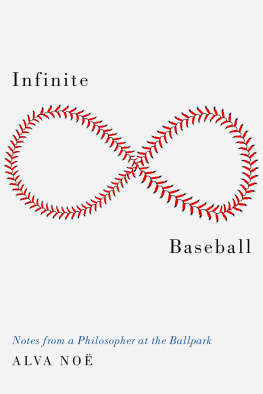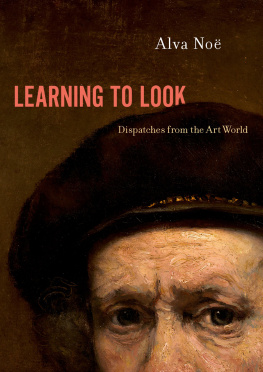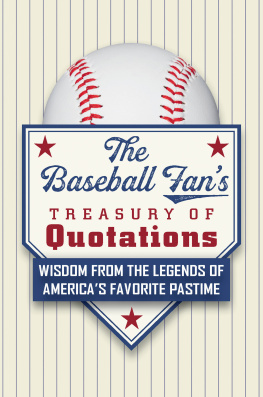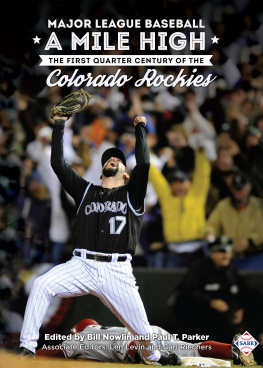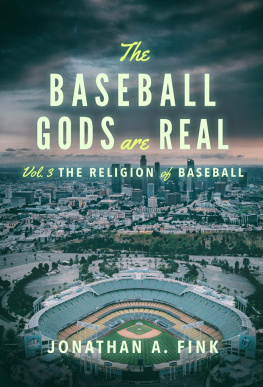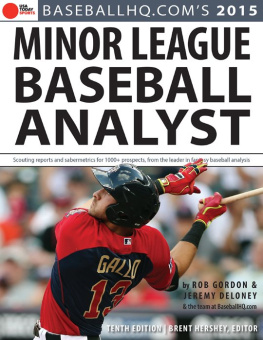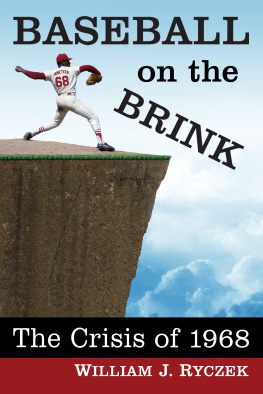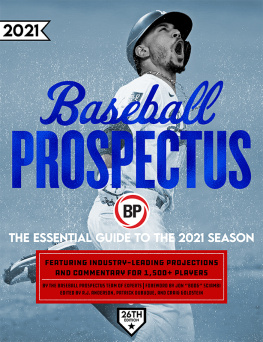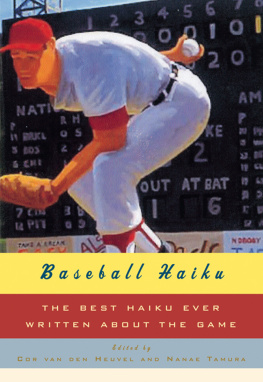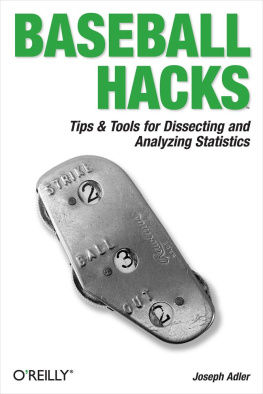INFINITE BASEBALL

Oxford University Press is a department of the University of Oxford. It furthers the Universitys objective of excellence in research, scholarship, and education by publishing worldwide. Oxford is a registered trade mark of Oxford University Press in the UK and certain other countries.
Published in the United States of America by Oxford University Press
198 Madison Avenue, New York, NY 10016, United States of America.
Oxford University Press 2019
All rights reserved. No part of this publication may be reproduced, stored in a retrieval system, or transmitted, in any form or by any means, without the prior permission in writing of Oxford University Press, or as expressly permitted by law, by license, or under terms agreed with the appropriate reproduction rights organization. Inquiries concerning reproduction outside the scope of the above should be sent to the Rights Department, Oxford University Press, at the address above.
You must not circulate this work in any other form and you must impose this same condition on any acquirer.
CIP data is on file at the Library of Congress
ISBN 9780190928186
eISBN 9780190928209
For Ulysses
The goal is to arrive at immediacy after reflection.
KIERKEGAARD
Contents
In Praise of Being Bored
Keeping Score
The Communication Game
Making Peace With Our Cyborg Nature
Baseball Memories
This is a book about baseball. Or, rather, its a book about baseball by a philosopher. But do not be alarmed. It is not a work of philosophy, at least not in the conventional, academic sense. Most of the short writings gathered here were published between 2010 and 2017 on National Public Radios now sadly defunct science and culture website 13.7: Cosmos and Culture. Many of them were occasioned by current events; all of them were meant to be standalone pieces of writing. Becauseas I soon came to realizethey work together to articulate a new idea about baseball and its broader significance, I decided to publish them together in single volume.
The introductory chapter is a different animal. I have written it, in good measure, to try to integrate and organize the ideas contained in the short chapters that follow. It is a work of philosophy, although again I would say not of the conventional academic variety. Its purpose is to defend the following claims about baseball, all of which are explored, with a somewhat lighter touch, in the chapters themselves:
What happens in baseball is less a matter of the material facts on the ground than it is a matter of who did whatthat is, who is to be credited with this or that action. To play baseball is always to be absorbed in the task of figuring out how to apportion praise and blame. Baseballs concerns are, in this sense, forensic or juridical.
The activity of playing the game contains the activity of this reflection on the activity itself as a part. In this respect, it is like the law, and like language.
Scorekeeping in baseball is not something we do from the outside, as it were, looking in. Figuring out the score, making up the account, telling the storythis is one of baseballs essential activities.
It is widely believed that baseball is a numbers game. But it isnt. Not really. Its not a quantitative game. Its a normative game, for its main concern is who deserves credit or blame for what. In this sense, it is a philosophical game.
I discuss a wide range of other topics in the short writings collected here, ranging from the nature of fandom and the baseball-like character of language, to the use of so-called performance-enhancing drugs, to the charms and values of youth baseball. The reader is invited to dip in without preparation; this is not a book that needs to be read from start to finish. I hope the essays stimulate and give pleasure.
INFINITE BASEBALL
I The Infinite Game
The Pitcher
His art is eccentricity, his aim
How not to hit the mark he seems to aim at.
His passion how to avoid the obvious,
His technique how to vary the avoidance.
The others throw to be comprehended. He
Throws to be a moment misunderstood.
Yet not too much. Not errant, arrant, wild,
But every seeming aberration willed.
Not to, yet still, still to communicate
Making the batter understand too late.
Robert Francis
Plato said that the gods love what is good; things are not good because the gods love them.
Its the other way around when it comes to baseball. Its just a game, but we make it good through our love. We dont play baseball and watch it and write about it and think about it because it is so darn special. Its specialit is specialbecause we care so much about it, because we play baseball and sing its praises and write about it and endeavor to revise it and make it better.
Stop and watch the kids playing baseball at the local field. Take a good look. Now ask yourself, What are they doing? You see them pitch, hit, run, throw, catch. You see them make plays. Man on first, one out, hard grounder to short; No outs, runners on first and third, ball popped up to the pitcher. But you also see them talk. There is a lot of talking. What are they talking about? Theyre telling each other what to do, they are explaining what they did wrong; they are jabbering to distract, but also to motivate; theyre thinking about what the next pitch should be, or what its likely to be. Theyre directing each other, signaling back and forth, attempting in real time to get a handle on the situation. They talk as they practice and play, and their talk concerns the stuff, all that matters, of their activity. They listen. They try to focus. They also sit, stretch, swing bats, study playbooks, put on masks and chest protectors, adjust cups; they eat, drink, spit, laugh, curse. They chant and they call out: Good eye! Good eye! or You got this! or Two strikes now. Gotta protect! Gotta protect! They cast glances at their parents. They work hard to manage their emotions.
And the boys and girls on the field are not alone in this freewheeling conversation and engagement with the play. The coaches are in the thick of it. As are the umps, if there are any. And then there are the spectators. They are no less invested in the actions that do not so much unfold before them as lure them in and make them complicit. They dont just watch; they cheer; they command and advise; they participate in the practice of trying, in effect, to articulate, or of trying to grasp and keep track of, the game. They scatter when a ball is hit into foul territory to make room so the fielders can play the ball.
Where does the game stop and all this chatter and observation and debate begin? If you look and pay attention, youll have to admit, the limits of the game are not drawn, in any straightforward sense, around the field of play itself. Baseball, in truth, is a practice that is bigger than that.
There is so much writing about baseball, not just good writing, but good writing by intellectuals. No other American sport, with the possible exception of boxing, as others have noticed, has come close to attracting the attention not only of fans and specialists but also of intellectuals who feel called on not just to celebrate the game but also to understand it, and to find the words to say why we love it so. Stephen Jay Gould, the great paleontologist and scholar of evolutionary history, took up this question in the introduction to his own collected writings on baseball. (Yes, he wrote a collection of writings on baseball.

